Dear Annie, do you know of anything natural to help relieve Benign Prostatic Hyperplasia or BPH? I am 70 years old and have been experiencing an enlarged prostate for 2 to 3 years. Anything you can suggest would be helpful.
Hi, thank you for asking. First, allow me to explain that Benign Prostatic Hyperplasia (BPH) is a chronic condition that affects 50-60% of all men over the age of 60. The good news is that Men have been successfully using herbs and yoga therapy to manage, aid and restore prostate function for, well almost ever. Let’s start with a brief explanation of what BPH is and how it happens. Then we’ll look at some helpful natural solutions for you to decrease the prostate enlargement and relieve your symptoms.
- Symptoms of BPH
- Causes of Benign Prostatic Hyperplasia
- Herbal Solutions
- Dietary suggestions and supplements for BPH
- Recipes
- Product Suggestions
About Benign Prostatic Hyperplasia (BPH)
Let us start with a little anatomy. The prostate is a small gland under the bladder about the size of a walnut. And is situated between the bladder and the penis, in front of the rectum. The urethra runs through the prostate where it carries urine from the bladder to the penis and out of the body.
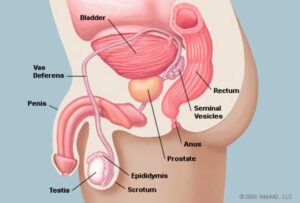
Benign prostatic hyperplasia (BPH) happens when cells inside the prostate begin to multiply. With the excess growth, your prostate gland swells or becomes enlarged. As a result of the inflammation, the urethra is squeezed, thereby limiting the flow of urine.
It’s important to understand is that BPH is not prostate cancer. Furthermore, BPH does not increase the risk of cancer. The extra cell growth of BPH begins in the heart of the prostate. Usually near the inner ring, around the urethra. From there it continues growing outward. In contrast, the growth of prostate cancer begins in the outer layers of prostate and continues to grow outward.
Symptoms of Benign Prostatic Hyperplasia (BPH):
A healthy prostate gland is about the size of a walnut. Some say, BPH can cause the prostate to increase in size to as large as an orange. As the inflammation increases the passage of urine becomes limited. As a result, urination is more difficult. Moreover, if the flow of urine becomes blocked, pressure can back up causing significant damage to the urinary system.
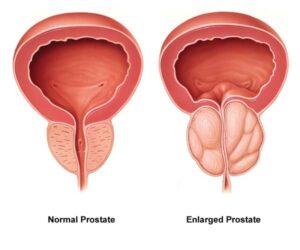
Following are some Common Symptoms of BPH:
- Difficulty starting the flow of urine
- A weak urine stream
- Low urine output, including dribbling or straining. Often with stops and starts during urination
- Frequent need to urinate
- Experiencing an urgent need to urinate
- The inability to empty the bladder completely
- Pain upon urination
- Nocturia or the need to urinate at night.
In advanced cases of BPH additional symptoms can include
- Urinary tract infections
- Urinary stones
- An Inability to urinate
- Blood present in the urine
- Damage to the urinary bladder
- Kidney Damage
Everyone’s symptoms are likely be a little bit different. Most men with an enlarged prostate will not have serious symptoms and won’t develop dangerous complications. However, if you experience ongoing urinary tract infections, or cannot urinate, see your doctor immediately. Remember, if the flow of urine becomes blocked the pressure can back up, leading to possible bladder and kidney damage.
Causes of Benign Prostatic Hyperplasia (BPH)
Although Benign Prostatic Hyperplasia can happen at any age, it more frequently in older men. Some 50 to 60% of all men 60 years of age or older are likely to suffer from BPH at some point. Moreover, the possibility of occurrence increases as men age. In the end, it is estimated that up to 90% of men over 80 years old will likely deal with this problem.
So, what causes Benign Prostatic Hyperplasia? Well, most experts think the cause is primarily hormonal. As men age, their Hormone levels fluctuate in a similar but different way as women. Testosterone levels decrease, disrupting the delicate harmony of the other hormones. First, dihydrotestosterone (DHT) levels increase. DHT is a potent pro-inflammatory hormone and one of our main culprits. Then, testosterone levels drop. When your testosterone drops, FSH (follicle stimulating hormone), LH (luteinizing hormone), prolactin, and estradiol all proportionally increase. All this causes and elevation in estrogens and prolactin. With a resulting decrease in the metabolism or assimilation of DHT, our inflammatory agent. Finally resulting in the inflammation of the prostate.
The Role of Nutrition in Benign Prostatic Hyperplasia
Diet and nutritional deficiencies are almost always involved. Deficiencies of zinc, vitamin E, magnesium, B vitamins, selenium, and Omega 3 fatty acids all play an important part. Plus, underlying conditions like obesity and insulin resistance can all cause biochemical and hormonal changes that increase your chances of excess prostate tissue growth.
Benign Prostatic Hyperplasia/Natural Solutions for Enlarged Prostate (BPH)
Natural solutions for BPH are likely to include herbal therapy, diet and nutritional modifications and nutritional supplementation. Yoga therapy and movement will also be beneficial. And will increase circulation to the area as well as help relieve the discomfort, inflammation and uncomfortable symptoms of BPH.
Remember, there is no one size fits all recommendation for Benign Prostatic Hyperplasia, or any condition. Each person is unique, every situation different. Everyone has a distinct constitution, lifestyle, and history. Each must be taken into consideration before making personalized health recommendations. With that in mind let’s look at some general ideas to get us started.
Herbal Solutions for BPH
Some of my favorite herbs for men with BPH are
Saw Palmetto (Serenoa repens)
Considered by many to be the gold standard for prostate issues. Saw Palmetto berries act as a hormonal regulator, adaptogen, immune tonic, urinary tonic, diuretic and immune regulator. It also has alternative or blood cleansing and anti-spasmodic properties, a nifty plant.
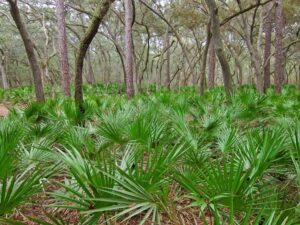
As a hormonal regulator, Saw Palmetto has the ability to decrease the inflammatory response by modulating or decreasing “free” testosterone. As a result it acts to limit the conversion of excess testosterone to dihydrotestosterone (DHT). Our inflammatory agent.
Saw Palmetto is indicted when urination is painful and when spasms are present. Often recommended in cases where the genitourinary system lacks tone, especially with age. It does not decrease the size of the prostate. The berries in an alcohol extract or standardized extract helps increase the flow of urine and decrease the tendency for stones. At the same time, Saw Palmetto tones the entire physical structure of the reproductive and urinary systems.
Think of Saw Palmetto to address nighttime and frequent urination and to tone or stabilize urine flow.
Saw Palmetto is best taken in an alcohol extract of 70% or greater to symptoms of BPH. Many naturopathic doctors suggest a Saw Palmetto standardized extract or 160 mg. More won’t hurt, but it hasn’t been shown to have any extra value.
Mullein root (Verbascum thapsus)
A very versatile herb. Mullein root is a soothing diuretic with astringent and ant-inflammatory effects on the bladder, prostate and urethra. Plus, it has a tightening or toning action on the muscles of the pelvic floor.
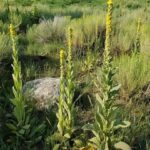
I have used Mullein root successfully for working with urinary frequency, interstitial cystitis and Benign Prostatic Hyperplasia. Furthermore, Mullein root helps reduce prostate swelling and inflammation. I like to use it in formula. For example, a mixture something like American Ginseng, Nettle root, Mother Wort and Saw Palmetto might work well as a long-term tonic to reduce the symptoms of BPH. A suggested dosage of the tincture would look like: 1.5-2 mL (about ¼ teaspoon) 3 to 4 times per day. If you prefer a water extract would also work nicely. To make a water extract, or decoction (a boiled tea), put 1 teaspoon dried herb in 8 oz of cold water. Bring to a boil and simmer slowly for 10 min. Then let it sit for a minimum of 10 min. Drink 2 cups per day.
Nettle root (Urtica dioica)
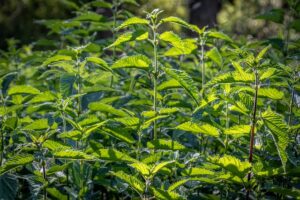
The root (and seeds) or the nettle plant have been studied in Europe as an alternative to Saw Palmetto for treating BPH (Safarinejad, 2005). While the root showed good benefits, it was not as effective as Saw Palmetto. Interestingly, the two herbs work via different mechanisms and in my experience, they have a synergistic effect when taken together. Consequently complementing each other very well. The Tincture (1:5) can be taken 2-3 mL TID (three times per day). Whereas the suggested dose of the tea or decoction is 1-2 tsp dried root, 8 oz water, decoct 10 -15 minutes, steep 1/2 hour. Take 4 oz TID (Three times per day)
Small flowered Willow herb (Epilobium parviflorum) and Fireweed (Epilobium angustifolium)
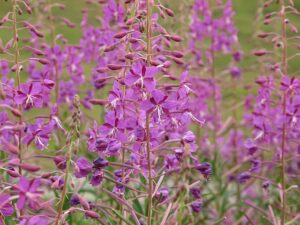
I love this pretty plant! It always shows up after a fire and when I’m looking for ways to balance moisture with heat. There are several verities of Epilobium and you can pretty much use them interchangeably. The results from a 2013 research by Pubmed supported the historical use of Epilobium spp plants in the treatment of enlarged prostate (Benign Prostatic Hyperplasia) and prostate cancer.
Fireweed is used extensively to treat bladder, kidney and prostate disorders. In the above study, extracts from Epilobium angustifolium, Epilobium parviflorum and Epilobium hirsutum (all fireweed family plants) were shown to stop irregular growth of prostate cells. Seeming to be equally effective for both benign and cancerous growths while at the same time reducing PSA levels. Epilobium spp plants also have a strong antioxidant, ant-tumor and anti-inflammatory effects on the prostate and the urinary system as a whole. The tincture can be taken 2-4 ml or about ½ to ¾ teaspoon 2x per day. To make the tea put 1-2 tsp. dried herb, 8 oz. hot water, steep 10-15 minutes, take 2 cups per day.
White Sage leaf (Salvia apiana)
White sage is an evergreen sage native of the American Southwest. It is considered sacred to Native Americans who use it in ceremony to cleanse toxins or negativity a practice called smudging. Strong evidence exists to support White Sages use, as well as the use of other smudging herbs. The smoke of such plants does in fact act as strong anti-bacterial, antibiotic and antimicrobial agents.
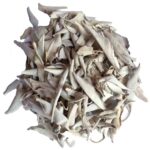
White sage is an aromatic sage that is a carminative, antiseptic, anti-inflammatory and powerful antioxidant. It is sometimes taken internally to reduce the pain and swelling of benign prostatic hyperplasia. According to herbalist David Winston, White Sage is probably the most effective herb to support the shrinking of a bogie, atonic prostate. It is also useful for BPH, prostatitis and cystitis. You can use the tincture, about 2 dropper fills (1 to 2 ml) up to 4 times per day. Or you can make the tea by covering 1/2 – 1 tsp dried leaves in 8 oz hot water and steeping covered for 20 minutes. Take 2 oz up to four times per day.
Aromatic Collinsonia (Collinsonia canadensis)
This herb is primarily indicated for pelvic and venous congestion. Congestions of this type can show up as hemorrhoids, varicose veins, benign prostatic hypertrophy and chronic laryngitis. It is also used for urinary calculi, diverticulosis, colitis, mitral valve prolapses and chronic heart weakness (with Hawthorn and Night Blooming Cereus).
There are also several less common herbs that can used to help alleviating Benign Prostatic Hyperplasia symptoms with good results. Some of these herbs include Sourwood leaves (Oxydendron arboreum), Trailing Arbutus leaf (Epigea repens), Partridge Berry (Mitchella repens), Thuja (Thuja occidentalis), Eryngo root (Eryngium yuccifolium), White Poplar bark (Populus spp.), Birch leaf (Betula spp.), White Pond Lily (Nymphaeae odorata) and South African star grass (Hypoxis hemerocallidea).
Dietary suggestions for Benign Prostatic Hyperplasia (BPH)
If you suffer from BPH you will want to honestly assess your diet. One way to do this is to keep a food journal. Take some time each day to write down what you ate and how you feel. You may find that certain foods bring different ways of feelings. Some foods make you feel contented, vibrant, and healthy. While after eating other foods you feel lazy, tired, or lethargic. Notice how you ate the day before you had to urinate in the middle of the night more times than normal. What did you eat the day before you slept all the way through the night? You get the idea. Then use this information make changes to your diet. Focus on the foods that help you feel better.
More generalized dietary suggestions for Benign Prostatic Hyperplasia include,
- Reduce or avoid fast foods and foods that are high in trans-fatty acids.
- Stay away from refined carbohydrates.
- Avoid or reduce your use of alcohol (especially beer)
- Refuse meats that might contain synthetic hormones.
Increase These Foods
On the other hand, you’ll want to Increase consumption of legumes (isoflavones), seeds-especially flax seed (lignans) and pumpkin seeds. Increase your fiber intake. You may find foods like pumpkin seeds, fish, and walnuts helpful because of their high zinc content. Add a rainbow of food colors into your daily diet. Colorful foods are rich in antioxidants and anti-inflammatory carotenoids, especially those that are orange, yellow and red in color. Some foods to add might include pumpkin, squash, dried apricots, red, yellow, or orange peppers, beets, carrots, or dark green leafy vegetables.
Do you want to know more about how to adjust your diet to prevent BPH or decrease the symptoms? Here is a link from Doctors health press that goes into detail about dietary suggestions for an enlarged prostate.
Nutritional Supplements for Benign Prostatic Hyperplasia (BPH)
Several nutritional supplements help the body to find it’s way back to normal and healthy. Following is a list of frequently suggested for BPH.
- Amino acids are the elements that make up chemical foundations in the body. The most often suggested combination for this purpose includes the amino acids L-glutamine, L-alanine, and glycine. When taken together they help to stabilize the prostate gland and reduce BPH symptoms.
- DHA/EPA Omega 3 fatty acids help prevent testosterone from building up or binding in the prostate. Additionally, these fatty acids have anti-inflammatory and antioxidant effects.
- Pumpkin seed oil and a rye pollen extract called Cernilton are often used with success to relieve BPH symptoms. Pumpkin seeds are high in zinc, antioxidants and anti-inflammatory carotenoids.
- Vitamins, A, C, B-6, and E, as well as the minerals zinc, selenium, and magnesium are essential to for healthy prostate function.
- Lycopene, is a carotenoid that comes from plants that are yellow, red and orange in color. Studies show Lycopene may reduce the risk of developing BPH. Products and foods that contain lycopene include Saw Palmetto, Pygeum, Pumpkin seed oil and small-flowered Willow herb. A 2013 study showed that the consumtion of these products, in combination was effective in helping to reduce urinary frequency in men with BPH (Cowson, et al, 2013).
Recipes for Benign Prostatic Hyperplasia
Compound for males with BPH by Christa Sinadinos, Clinical Herbalist Combine individually formulated herbal extracts Nettle Root (Uritica dioica) 30 mls Mullein Root (Verbascum thapsus) 20 mls Yellow Pond Lily (Nuphar luteum) 20 mls Saw Palmetto (Serenoa repens) 20 mls Cleavers (Galium aparine) 15 mls Black Cohosh (Cimicifuga racemosa) 15 mls Suggested dose 60 to 90 drops, up to 3 times per day in 2-4 ounces of water
Product Suggestions for Benign Prostatic Hyperplasia (BPH)
Wonderment Gardens LLC
Through Wonderment Gardens online store, Annie makes available a wide range of products and services. Here we offer our full line of high quality, small batch, herbal products. Each made with love and integrity. All of our products, from beauty creams to medicinal tinctures, to children products and formulated with the utmost care an attention.
As a clinical herbalist, Annie is happy to meet with you to discuss your individualized needs. Click here to schedule an appointment for a consultation.
Affiliate Product Suggestions for Benign Prostatic Hyperplasia (BPH)
The following are affiliate links. That means, if you purchase a product through one of the links, I make a commission at no additional cost to you. Rest assured I only suggest products I can support and feel confident about. Thank you for your support.
Below are a few formulas I really Like for working with Benign Prostatic Hyperplasia
ProstNatural Formula from Supersmart
The more I work with this company, the more I like them. ProstaNatural is a comprehensive and well-formulated supplement, aimed at men over 50. It contains several nutrients necessary to improve urinary and prostate function, such as extracts of saw palmetto, nettle root and Aromatic Collinsonia. If you suffer from Benign Prostatic Hyperplasia ProstNatural is totally worth a try.
Prostate Health by Gaia Herbs
Gaia Herbs has long been one of my favorite company’s. You can always count on their quality. Prostate Health is no exception. A formula blended from herbs traditionally used for maintaining prostate health and function including, Saw Palmetto, Green Tea, Nettle root, Pomegranate, and White Sage.
Prostate Revive from Medix Select
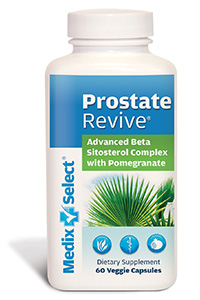
A great formula, Prostate Revive® was designed by renowned holistic physician David Brownstein, M.D.
Specifically formulated for men, Prostate Revive contains 15 powerful ingredients, including saw palmetto, plant sterols with beta-sitosterol, pomegranate extract, and a dozen more.
All 15 nutrients help to promote optimal prostate health and proper urinary frequency and flow.
Summary
In summary, a multi-dimensional approach is almost always the most successful strategy for the treatment of BPH or Benign Prostate Hyperplasia. It is important to address diet and lifestyle along with the addition of herbs. When we solve the underlying cause of a problem, we experience long lasting results. As a result we feel healthier and more rejuvenated.
Thank you for taking the time to read my blog. It is truly my bliss to share my experience and research with you. I hope you find it helpful. I would love to hear from you. Please contact me about your thoughts, ideas, and experiences you’d like to share.
Thank you
Blessings
Annie
References
https://www.healthline.com/health/bph-symptoms
Sinadinos, Christa. Clinical Herbalist; Medicinal Uses of Mullein Root, 2009, Medical Herbalism Publication
https://www.ncbi.nlm.nih.gov/pubmed/23436427
https://ndnr.com/oncology/management-of-bph-and-associated-urinary-tract-symptoms/
https://pubmed.ncbi.nlm.nih.gov/31577095/
https://pubmed.ncbi.nlm.nih.gov/16635963/
Winston, Davis RH (AGH), Men’s Health Issues: Herbal and Nutritional Treatment for Common Genito-Urinary Problems. Southwest Conference on Botanical Medicine Lecture Notes, 2015
Disclaimer
The statements and ideas presented here are not intended to diagnose, treat, cure, or prevent any disease or condition. They have not been evaluated by the FDA. All ideas presented are for the sole purpose of education. To help you take control of your own health. If you have a health concern or condition, consult a physician. We suggest that you always consult a medical doctor before modifying your diet, using any new product, drug, supplement, or doing any new exercises.
These statements and products have not been evaluated by the FDA. They are not intended to diagnose, treat, cure, or prevent any disease or condition. If you have a health concern or condition, consult a physician. Always consult a medical doctor before modifying your diet, using any new product, drug, supplement, or doing any new exercises.
Herbs taken for health purposes need to be treated with the same care as medicine. Herbal remedies are no substitute for a healthy diet and lifestyle. If you are serious about good health, you’ll want to combine diet, exercise, herbals, a good relationship with your doctor and a generally healthy lifestyle. No one of these will do it alone.
All information provided is designed to be used as part of a complete health plan. No products are intended to replace your doctor’s care, or to supersede any of his/her advice or prescriptions.


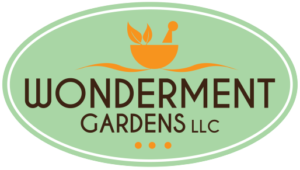
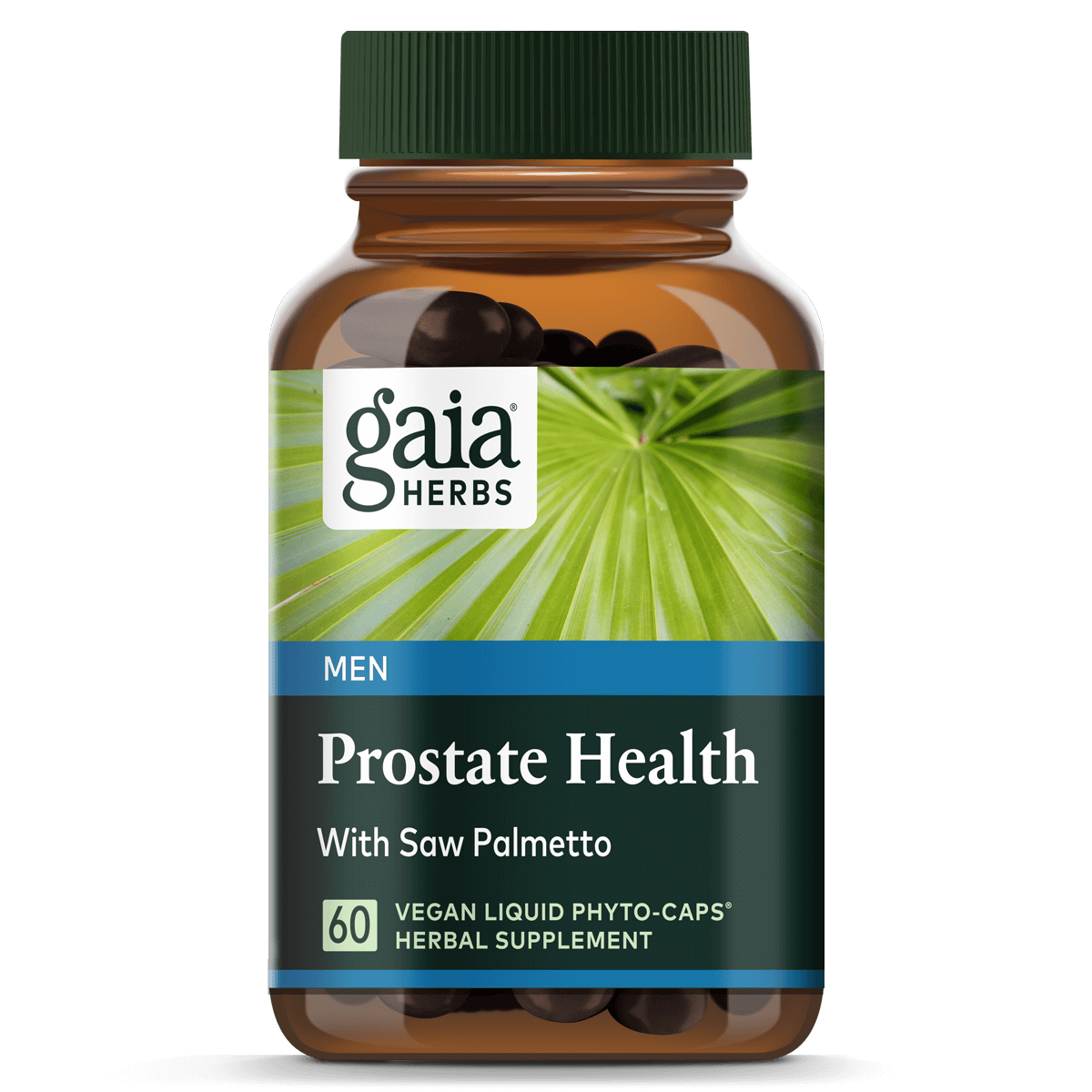
Pingback: An Herbal Interlude with Common Mullein - Wonderment Gardens
Youre so cool! I dont suppose Ive read anything like this before. So nice to find somebody with some original thoughts on this subject. realy thank you for starting this up. this website is something that is needed on the web, someone with a little originality. useful job for bringing something new to the internet!
Wow that was strange. I just wrote an extremely long comment but after I clicked submit my comment didn’t show up. Grrrr… well I’m not writing all that over again. Anyway, just wanted to say superb blog!
Sorry the longer comment didn’t show up. Thanks for your comment
Does your website have a contact page? I’m having problems locating it but, I’d like to send you an email. I’ve got some recommendations for your blog you might be interested in hearing. Either way, great site and I look forward to seeing it improve over time.
https://wondermentgardens.com/contact/